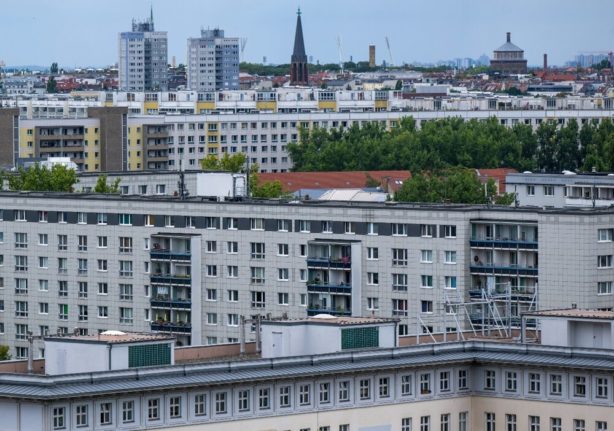REVEALED: Germany's planned hardship fund to help with energy bills

The gas and electricity price caps are coming, and the government wants to pay people's energy bills in December - but will that be enough to stop people falling into hardship? Germany's Economics Ministry thinks it won't be and has drafted plans for a new hardship fund. Here's what you need to know.
When Germany's traffic light coalition parties - the SPD, Greens and FDP - took office last December, they had no idea that they would be facing an energy crisis on such a major scale.
But with Russia's invasion of Ukraine sending the gas market into turmoil, the coalition's big plans have been put on the backburner as they work out how best to support people with rising costs.
Under the latest set of energy relief measures put forward by the Gas Price Commission, the government will shoulder the cost of people's energy bills this December. It also plans to introduce a cap on both electricity and gas prices, which will come into force next March and be backdated to January.
READ ALSO: Germany plans to cap energy prices from start of 2023
This multi-billion relief package is likely to soften the blow for many households, but according to a new government document obtained by Bild, ministers are concerned that it won't be enough to stop many people - and businesses - falling into financial hardship.
To ensure this doesn't happen, federal and state economists ministers want to set aside billions more for additional aid.
Here's who can get hold of the extra cash - and how.
Renters and private home owners
People who rent an apartment in Germany and home owners who live in their properties can access additional help from the state if they can prove they're over-burdened by their heating and energy costs.
That could be due to an eye-wateringly high back-payment for energy bills demanded by the landlord or due to the fact that they have to purchase expensive fuel such as wood pellets for heating.
More specifically, people claiming unemployment benefits such as Bürgergeld can get some extra cash from the Jobcenter after their bills are calculated by the landlord. If they're facing a hefty back-payment, or Nachzahlung, they can get up to three months of Bürgergeld retroactively to help cover the costs.
In addition, someone who wants to claim Bürgergeld for a single month will be spared from having to prove the amount of money they have in the bank. Under the ordinary rules for Bürgergeld claimants, job seekers must have less than €40,000 in savings.
According to the government's calculations, this emergency buffer is set to cost around €500 million. Claims for additional support will be handled by the job centres or social offices.
Small- and medium-sized businesses (SMEs)
Small business owners have been among the hardest hit by the energy crisis - but luckily help may be on its way.
In the document obtained by Bild, ministers say they assume that the gas and electricity price cap will be an adequate level of support for most SMEs. Nevertheless, there could be a few circumstances in which business owners slip through the net:
- Business owners may already be facing huge hikes in their energy bills before the price caps come into force, for example in the form of a big back-payment for energy costs over several months, or
- Businesses may find that, due to exceptional circumstances, they're still unable to pay their bills - even after the price caps are introduced.
In these two scenarios, SMEs can apply for extra support from the government.
To be eligible, businesses must either show that their energy costs quadrupled at least three months between January and November 2022, or they'll have to show that their energy costs have also multiplied in spite of the energy price cap and that their business is highly energy-intensive or costly.
The government expects this support package to cost around €1 billion and says that the details will be worked out after state premiers agree to the proposals.
READ ALSO: How electricity prices are rising across Germany
Housing companies
Large landlords could also be in line for some additional government aid under the ministers' plans. Due to the way the current rental system works, many are paying high bills for heating and energy that they're not yet able to recoup from tenants in the end-of-year bill.

Housing complexes in Berlin. Photo: picture alliance/dpa | Monika Skolimowska
To help housing companies that are in this situation, the government wants to offer loans that could help tide them over. Twenty percent of this credit would be secured by the federal states, and the measure is expected to cost around €1.1 billion.
Hospitals and care homes
Care facilities and clinics face exorbitant energy bills - even in ordinary times - so this group of institutions will also be given financial aid, the draft said.
This will come in the form of a one-off support payment and ongoing support with gas and electricity bills. Hospitals and care homes will in many cases get their additional costs for energy completely refunded by the state until April 2024. Social agencies and social service providers will also be given subsidies and financial aid to help deal with their increased overheads.
In addition, cultural sites and facilities like museums and art galleries will get subsidies intended to flatten out the rise in energy costs. In most cases, the energy price cap only applies to 80 percent of a business' ordinary consumption, but this limit will be dispensed with for cultural institutions.
However, the government says it still wants to incentive energy-saving measures as well as offering financial support.
READ ALSO: When will people in Germany get their December gas bill payout?
Comments
See Also
When Germany's traffic light coalition parties - the SPD, Greens and FDP - took office last December, they had no idea that they would be facing an energy crisis on such a major scale.
But with Russia's invasion of Ukraine sending the gas market into turmoil, the coalition's big plans have been put on the backburner as they work out how best to support people with rising costs.
Under the latest set of energy relief measures put forward by the Gas Price Commission, the government will shoulder the cost of people's energy bills this December. It also plans to introduce a cap on both electricity and gas prices, which will come into force next March and be backdated to January.
READ ALSO: Germany plans to cap energy prices from start of 2023
This multi-billion relief package is likely to soften the blow for many households, but according to a new government document obtained by Bild, ministers are concerned that it won't be enough to stop many people - and businesses - falling into financial hardship.
To ensure this doesn't happen, federal and state economists ministers want to set aside billions more for additional aid.
Here's who can get hold of the extra cash - and how.
Renters and private home owners
People who rent an apartment in Germany and home owners who live in their properties can access additional help from the state if they can prove they're over-burdened by their heating and energy costs.
That could be due to an eye-wateringly high back-payment for energy bills demanded by the landlord or due to the fact that they have to purchase expensive fuel such as wood pellets for heating.
More specifically, people claiming unemployment benefits such as Bürgergeld can get some extra cash from the Jobcenter after their bills are calculated by the landlord. If they're facing a hefty back-payment, or Nachzahlung, they can get up to three months of Bürgergeld retroactively to help cover the costs.
In addition, someone who wants to claim Bürgergeld for a single month will be spared from having to prove the amount of money they have in the bank. Under the ordinary rules for Bürgergeld claimants, job seekers must have less than €40,000 in savings.
According to the government's calculations, this emergency buffer is set to cost around €500 million. Claims for additional support will be handled by the job centres or social offices.
Small- and medium-sized businesses (SMEs)
Small business owners have been among the hardest hit by the energy crisis - but luckily help may be on its way.
In the document obtained by Bild, ministers say they assume that the gas and electricity price cap will be an adequate level of support for most SMEs. Nevertheless, there could be a few circumstances in which business owners slip through the net:
- Business owners may already be facing huge hikes in their energy bills before the price caps come into force, for example in the form of a big back-payment for energy costs over several months, or
- Businesses may find that, due to exceptional circumstances, they're still unable to pay their bills - even after the price caps are introduced.
In these two scenarios, SMEs can apply for extra support from the government.
To be eligible, businesses must either show that their energy costs quadrupled at least three months between January and November 2022, or they'll have to show that their energy costs have also multiplied in spite of the energy price cap and that their business is highly energy-intensive or costly.
The government expects this support package to cost around €1 billion and says that the details will be worked out after state premiers agree to the proposals.
READ ALSO: How electricity prices are rising across Germany
Housing companies
Large landlords could also be in line for some additional government aid under the ministers' plans. Due to the way the current rental system works, many are paying high bills for heating and energy that they're not yet able to recoup from tenants in the end-of-year bill.

To help housing companies that are in this situation, the government wants to offer loans that could help tide them over. Twenty percent of this credit would be secured by the federal states, and the measure is expected to cost around €1.1 billion.
Hospitals and care homes
Care facilities and clinics face exorbitant energy bills - even in ordinary times - so this group of institutions will also be given financial aid, the draft said.
This will come in the form of a one-off support payment and ongoing support with gas and electricity bills. Hospitals and care homes will in many cases get their additional costs for energy completely refunded by the state until April 2024. Social agencies and social service providers will also be given subsidies and financial aid to help deal with their increased overheads.
In addition, cultural sites and facilities like museums and art galleries will get subsidies intended to flatten out the rise in energy costs. In most cases, the energy price cap only applies to 80 percent of a business' ordinary consumption, but this limit will be dispensed with for cultural institutions.
However, the government says it still wants to incentive energy-saving measures as well as offering financial support.
READ ALSO: When will people in Germany get their December gas bill payout?
Join the conversation in our comments section below. Share your own views and experience and if you have a question or suggestion for our journalists then email us at [email protected].
Please keep comments civil, constructive and on topic – and make sure to read our terms of use before getting involved.
Please log in here to leave a comment.